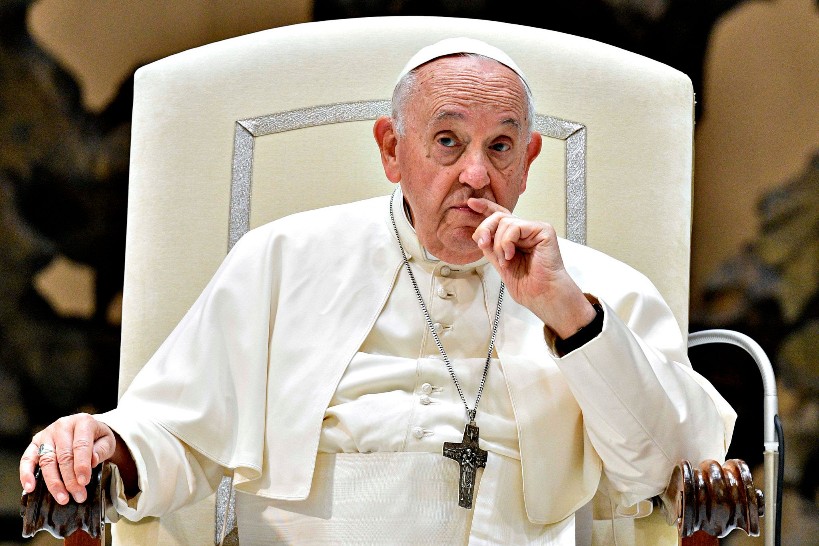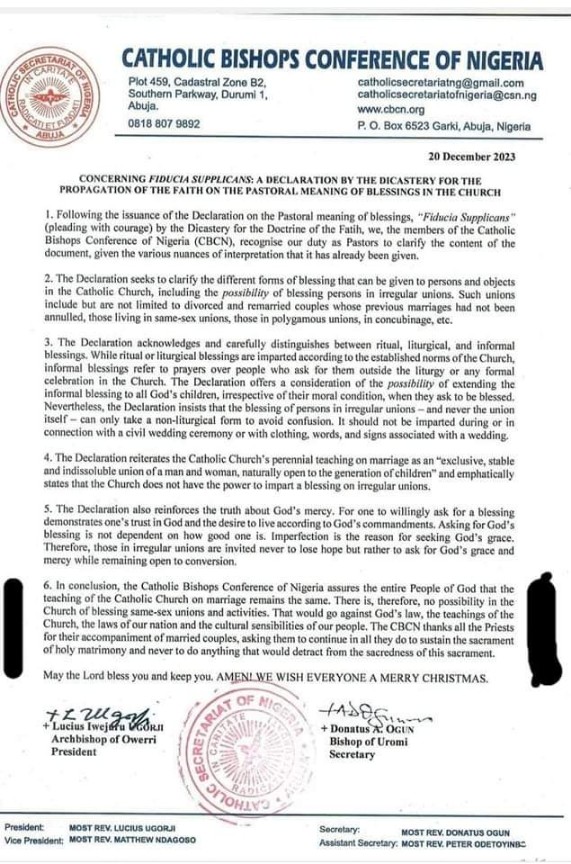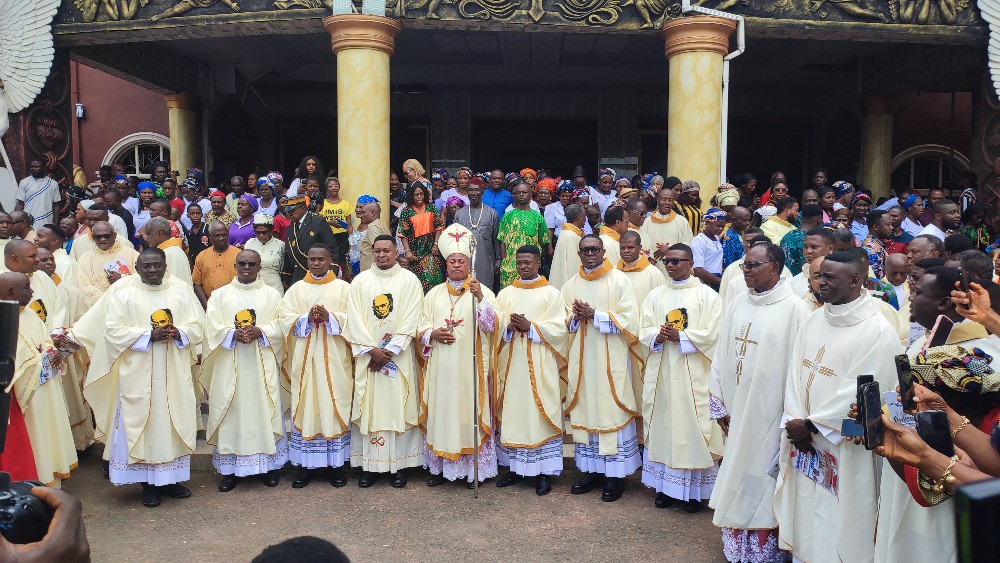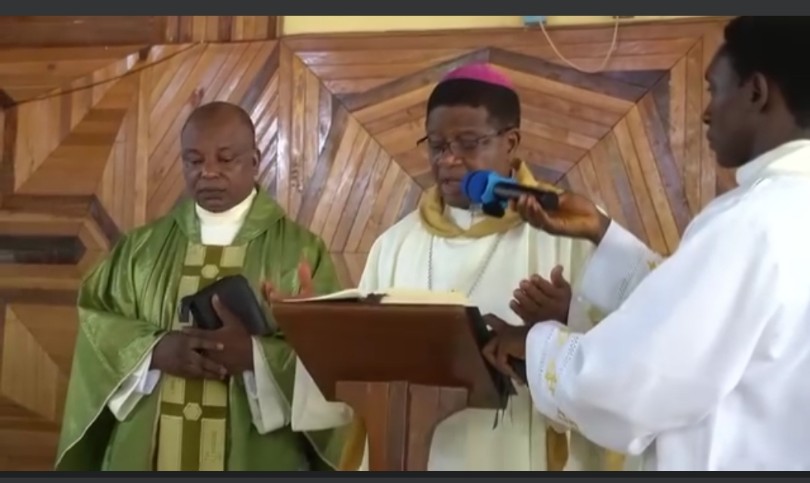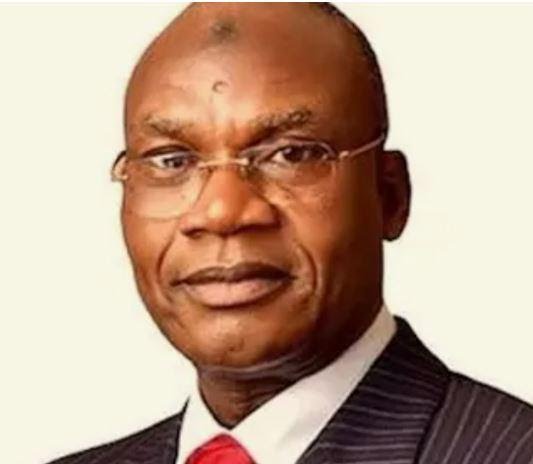
Interpretating Fiducia Supplicans: Catholic priests cannot administer sacrament of marriage to same sex couples
Saturday Dec 23, 2023 6:17 am
By Culled from sources by Onyeka Uwakwe
Anambra,
News
Catholics say same-sex couples can be blessed without changing the doctrine of marriage.
A statement authorised by Pope Francis, which parallels discussion in the Church of England, says it is possible to bless same-sex couples, but without offering the impression of a marriage.
“Fiducia Supplicans,” issued by the Dicastery for the Doctrine of the Faith, says that the Catholic doctrine of marriage has not changed. In this story, The Other Cheek attempts to quote enough of the official document to show the thinking behind the declaration.
“This Declaration remains firm on the traditional doctrine of the Church about marriage, not allowing any type of liturgical rite or blessing similar to a liturgical rite that can create confusion,” the official English translation of Fiducia supplicans said. “The value of this document, however, is that it offers a specific and innovative contribution to the pastoral meaning of blessings, permitting a broadening and enrichment of the classical understanding of blessings, which is closely linked to a liturgical perspective.”
This raises the question of what the blessings mean. “On the Pastoral Meaning of Blessings” – the English translation of the declaration’s title indicates that these same-sex blessings form part of a declaration about what it means to be blessed by a catholic priest. The declaration’s full text is here.
Marriage
The new statement is written as a further response to questions (dubia) posed by conservative cardinals. It responds to questions they posed about whether there was any change to marriage.
“Pope Francis’ recent response to the second of the five questions posed by two Cardinals offers an opportunity to explore this issue further, especially in its pastoral implications. It is a matter of avoiding that “something that is not marriage is being recognized as marriage.” [1] Therefore, rites and prayers that could create confusion between what constitutes marriage—which is the “exclusive, stable, and indissoluble union between a man and a woman, naturally open to the generation of children”—and what contradicts it are inadmissible. This conviction is grounded in the perennial Catholic doctrine of marriage; it is only in this context that sexual relations find their natural, proper, and fully human meaning. The Church’s doctrine on this point remains firm.”
Blessings
“Fiducia Supplicans,” says the church can not bless sex outside of man-women marriage.
“..it is necessary that what is blessed corresponds with God’s designs written in the creation and fully revealed by Christ the Lord. For this reason, since the Church has always considered only those sexual relations that are lived out within marriage to be morally licit, the Church does not have the power to confer its liturgical blessing when that would somehow offer a form of moral legitimacy to a union that presumes to be a marriage or to an extra-marital sexual practice. The Holy Father reiterated the substance of this Declaration in his Respuestas to the Dubia of two Cardinals.
But this does not rule out blessings. “One must also avoid the risk of reducing the meaning of blessings to this point of view alone, for it would lead us to expect the same moral conditions for a simple blessing that are called for in the reception of the sacraments. “
Bible Blessings: “Fiducia Supplicans” surveys the role of blessings in the Bible from Melchizedek, the Psalms to Jesus blessing Children.
Blessing as a pastoral act. “In order to help us understand the value of a more pastoral approach to blessings, Pope Francis urges us to contemplate, with an attitude of faith and fatherly mercy, the fact that “when one asks for a blessing, one is expressing a petition for God’s assistance, a plea to live better, and confidence in a Father who can help us live better.”[2] This request should, in every way, be valued, accompanied, and received with gratitude. People who come spontaneously to ask for a blessing show by this request their sincere openness to transcendence, the confidence of their hearts that they do not trust in their own strength alone, their need for God, and their desire to break out of the narrow confines of this world, enclosed in its limitations.
Everyone who asks for a blessing should get one: The Church’s liturgy itself invites us to adopt this trusting attitude, even in the midst of our sins, lack of merits, weaknesses, and confusions, as witnessed by this beautiful Collect from the Roman Missal: “Almighty ever-living God, who in the abundance of your kindness surpass the merits and the desires of those who entreat you, pour out your mercy upon us to pardon what conscience dreads and to give what prayer does not dare to ask” (Collect for the Twenty-Seventh Sunday of Ordinary Time). How often, through a pastor’s simple blessing, which does not claim to sanction or legitimize anything, can people experience the nearness of the Father beyond all “merits” and “desires”?
Sinners can ask for a blessing: “… even when a person’s relationship with God is clouded by sin, he can always ask for a blessing, stretching out his hand to God, as Peter did in the storm when he cried out to Jesus, “Lord, save me!” (Matthew14:30). Indeed, desiring and receiving a blessing can be the possible good in some situations. Pope Francis reminds us that “a small step, in the midst of great human limitations, can be more pleasing to God than a life which appears outwardly in order but moves through the day without confronting great difficulties.”[3] In this way, “what shines forth is the beauty of the saving love of God made manifest in Jesus Christ, who died and rose from the dead.”[4]
A translation to Protestant-speak
For a non-Catholic Christian, blessing something can mean giving approval to an idea or project. But the Catholic ideas in “Fiducia Supplicans” are different to that.
Possibly the best parallel for non-Catholics is prayer. The thinking in “Fiducia Supplicans” is that a priest giving a blessing encourages someone to seek God. This is on the basis that God can work in peopl’e lives – and asking for a blessing can be a sign of that. So,, a protestant version might be when someone asks for prayer.
Perhaps the everyday protestant version of “blessing” is prayer. In everyday conversation, a common response is to say “I will pray for you.”
That might be specific – praying for healing, or for a job, but it might simply be a general assurance that one will pray for God to do good things, and draw them to him.
“I will pray for you” is the closest non-Catholic equivelent of the blessings “Fiducia Supplicans” discusses.
[1] [2]Quotes the questions raised by the Cardinals.
[3] Francis, Ap. Exhort. Evangelii Gaudium (24 November 2013), no. 44: AAS 105 (2013), 1038-1039.
[4] Ibid., no. 36: AAS 105 (2013), 1035.
Credit| THE OTHER CHEEK
A rare ‘declaration’
The first thing to note is that the document is a “declaration” — the most important level of document issued by the Vatican’s doctrine department.
To get a sense of how rare it is, consider that the last such declaration was the text Dominus Iesus in the year 2000. That document, on the “unicity and salvific universality of Jesus Christ,” also unleashed strong responses.
The new declaration, “on the pastoral meaning of blessings,” consists of an initial “presentation” by Cardinal Fernández, followed by 45 numbered paragraphs, organized into an introduction and four sections, and supported by 31 numbered footnotes.
The text’s title, Fiducia supplicans, comes from its incipit, or opening: “The supplicating trust of the faithful People of God receives the gift of blessing that flows from the Heart of Christ through his Church.”
The declaration is dated Dec. 18 and signed by Fernández and Msgr. Armando Matteo, secretary for the DDF’s doctrinal section, who had a private audience with Pope Francis on the same day.
The text was not issued in forma specifica, a particular formula in which a curial document is effectively co-signed by the pope, giving it full papal weight.
What’s the background?
In 2021, the Vatican’s doctrinal office issued a document known as a “responsum,” replying to the question of whether the Church has “the power to give the blessing to unions of persons of the same sex.”
Its answer was “negative” — and the reasoning for that answer was set out in an accompanying “explanatory note.” The intervention, which was approved by Pope Francis, generated protests among Catholics in countries where same-sex blessings are common practice, especially Germany.
Despite the ruling, bishops in both Germany and neighboring Belgium began to advance contrasting proposals for the regulation of same-sex blessings, raising the topic’s profile among Catholics worldwide.
In July this year, Pope Francis himself addressed the issue, in response to a series of question from five cardinals.
The pope wrote that “pastoral prudence must adequately discern whether there are forms of blessing, requested by one or more persons, that do not convey an erroneous conception of marriage.”
But he added that it was “not appropriate for a diocese, a bishops’ conference, or any other ecclesial structure to constantly and officially establish procedures or rituals for all kinds of matters.”
In his “presentation” of the new declaration, Cardinal Fernández — who was appointed doctrinal chief in July and took up the post in September — stressed that the text went through a rigorous appraisal process before its publication.
“In preparing the document, the dicastery, as is its practice, consulted experts, undertook a careful drafting process, and discussed the text in the congresso of the doctrinal section of the dicastery,” he wrote.
“During that time, the document was discussed with the Holy Father. Finally, the text of the declaration was submitted to the Holy Father for his review, and he approved it with his signature.”
Fernández said that the pope’s July response, which was issued while the declaration was being studied, “provided important clarifications for this reflection and represents a decisive element for the work” of the doctrinal dicastery.
The cardinal insisted that, like the July response, “this declaration remains firm on the traditional doctrine of the Church about marriage, not allowing any type of liturgical rite or blessing similar to a liturgical rite that can create confusion.”
The declaration was released simultaneously in Italian, French, English, Spanish, and — perhaps significantly — German.
inclusion, solidarity, and peacemaking.”
Addressing the “theological-pastoral” understanding of blessings, the text emphasizes “the value of a more pastoral approach.”
“From the point of view of pastoral care, blessings should be evaluated as acts of devotion that ‘are external to the celebration of the Holy Eucharist and of the other sacraments,’” it says, quoting the Vatican liturgy dicastery’s Directory on Popular Piety and the Liturgy.
“The Church, moreover, must shy away from resting its pastoral praxis on the fixed nature of certain doctrinal or disciplinary schemes, especially when they lead to ‘a narcissistic and authoritarian elitism, whereby instead of evangelizing, one analyzes and classifies others, and instead of opening the door to grace, one exhausts his or her energies in inspecting and verifying,’” says the declaration, citing Pope Francis’ 2013 apostolic exhortation Evangelii Gaudium.
“Thus, when people ask for a blessing, an exhaustive moral analysis should not be placed as a precondition for conferring it. For, those seeking a blessing should not be required to have prior moral perfection,” the Dec. 18 document says.
While repeating Pope Francis’ July statement cautioning against officially establishing “procedures or rituals,” the declaration says that “pastoral prudence and wisdom — avoiding all serious forms of scandal and confusion among the faithful — may suggest that the ordained minister join in the prayer of those persons who, although in a union that cannot be compared in any way to a marriage, desire to entrust themselves to the Lord and his mercy, to invoke his help, and to be guided to a greater understanding of his plan of love and of truth.”
The third section, Blessings of Couples in Irregular Situations and of Couples of the Same Sex, says that the preceding considerations show there is a “possibility of blessings for couples in irregular situations and for couples of the same sex.” But it insists that their form “should not be fixed ritually by ecclesial authorities to avoid producing confusion with the blessing proper to the Sacrament of Marriage.”
“In such cases,” it says, “a blessing may be imparted that not only has an ascending value but also involves the invocation of a blessing that descends from God upon those who — recognizing themselves to be destitute and in need of his help — do not claim a legitimation of their own status, but who beg that all that is true, good, and humanly valid in their lives and their relationships be enriched, healed, and elevated by the presence of the Holy Spirit.”
The declaration says that Pope Francis wants these “non-ritualized blessings” to remain spontaneous, never losing their quality as “simple gestures that provide an effective means of increasing trust in God on the part of the people who ask for them, careful that they should not become a liturgical or semi-liturgical act, similar to a sacrament.”
The text stresses that Catholics should “neither provide for nor promote a ritual for the blessings of couples in an irregular situation,” but at the same time, “not prevent or prohibit” the Church from responding to people seeking God’s help through “a simple blessing.”
“In a brief prayer preceding this spontaneous blessing, the ordained minister could ask that the individuals have peace, health, a spirit of patience, dialogue, and mutual assistance — but also God’s light and strength to be able to fulfill his will completely,” it suggests.
Speaking of couples in irregular situations, the text adds that to avoid confusion or scandal blessings must “never be imparted in concurrence with the ceremonies of a civil union, and not even in connection with them.”
“Nor can it be performed with any clothing, gestures, or words that are proper to a wedding. The same applies when the blessing is requested by a same-sex couple,” it says.
The declaration proposes that simple blessings could be offered “in other contexts, such as a visit to a shrine, a meeting with a priest, a prayer recited in a group, or during a pilgrimage.”
The third section ends by insisting that these principles are “sufficient to guide the prudent and fatherly discernment of ordained ministers,” and that “no further responses should be expected about possible ways to regulate details or practicalities regarding blessings.
In the fourth section, The Church is the Sacrament of God’s Infinite Love, the declaration says that all forms of blessing are an opportunity for evangelization.
The text concludes by stressing the importance of offering blessings, so that “every brother and every sister will be able to feel that, in the Church, they are always pilgrims, always beggars, always loved, and, despite everything, always blessed.”
Source| John Sandeman| The Pillar
Take away
“Thus, when people ask for a blessing, an exhaustive moral analysis should not be placed as a precondition for conferring it. For, those seeking a blessing should not be required to have prior moral perfection,” the Dec. 18 document says.
Catholics should “neither provide for nor promote a ritual for the blessings of couples in an irregular situation,” but at the same time, “not prevent or prohibit” the Church from responding to people seeking God’s help through “a simple blessing.”
Speaking of couples in irregular situations, the text adds that to avoid confusion or scandal blessings must “never be imparted in concurrence with the ceremonies of a civil union, and not even in connection with them.”
"Nor can it be performed with any clothing, gestures, or words that are proper to a wedding..."
“every brother and every sister will be able to feel that, in the Church, they are always pilgrims, always beggars, always loved, and, despite everything, always blessed.”
Stories from the same author
All Headlines
Categories
Return
Recent Stories

News
Unizik new Acting VC, Prof Carol Arinze-Umobi assumes duty, promises open-door administration.
Prof Ikechebelu reverts to office as DVC Admin

Society News
Chukwuemeka Odumegwu Ojukwu University staff, friends bid farewell to late legal icon, Sir Ignatius Obijiaku .

Education
Governing Council Federal Polytechnic, Nekede on courtesy visit to Imo State Governor, Hope Uzodinma.

Cover Story
Labour Party caucus of southeast lawmakers asks President Tinubu to release Nnamdi Kanu.
Goup calls on Southeast governors to grant financial autonomy to state Houses of Assembly

Sports
John Cena announces his retirement from WWE after 22 years.
John Cena to step away from wrestling next year after a retirement tour

News
Tony Oneweek set to perform in the UK from July 13.
Gyration master to thrill fans in Bournemouth, Glasgow, Basildon, Manchester, others
Most Read Stories

Sports
Wrestlemania XL: End of era as Cody Rhodes defeats Roman Reigns, finishes the story.
Roman Reigns was Undisputed WWE Universal Champion for 1316 days

News
Dennis Junior Seminary Mbieri Old Boys hold AGM, give award to Nwabueze, others .
Pharm Chris Ukachukwu delivers lecture

Cover Stories
Worship, eat and live: 100 caterers cook 10,000 bags of rice, 5,000 cows for Evang. Ebuka Obi, brother's birthday .

Sports
SummerSlam 2023: Cody Rhodes defeats Lesnar | Roman Reigns beats Jey Uso.
Iyo Sky cashes in Money in the Bank contract to win women’s title
Seth Rollins defeats Finn Balor
Catholics say same-sex couples can be blessed without changing the doctrine of marriage.
A statement authorised by Pope Francis, which parallels discussion in the Church of England, says it is possible to bless same-sex couples, but without offering the impression of a marriage.
“Fiducia Supplicans,” issued by the Dicastery for the Doctrine of the Faith, says that the Catholic doctrine of marriage has not changed. In this story, The Other Cheek attempts to quote enough of the official document to show the thinking behind the declaration.
“This Declaration remains firm on the traditional doctrine of the Church about marriage, not allowing any type of liturgical rite or blessing similar to a liturgical rite that can create confusion,” the official English translation of Fiducia supplicans said. “The value of this document, however, is that it offers a specific and innovative contribution to the pastoral meaning of blessings, permitting a broadening and enrichment of the classical understanding of blessings, which is closely linked to a liturgical perspective.”
This raises the question of what the blessings mean. “On the Pastoral Meaning of Blessings” – the English translation of the declaration’s title indicates that these same-sex blessings form part of a declaration about what it means to be blessed by a catholic priest. The declaration’s full text is here.
Marriage
The new statement is written as a further response to questions (dubia) posed by conservative cardinals. It responds to questions they posed about whether there was any change to marriage.
“Pope Francis’ recent response to the second of the five questions posed by two Cardinals offers an opportunity to explore this issue further, especially in its pastoral implications. It is a matter of avoiding that “something that is not marriage is being recognized as marriage.” [1] Therefore, rites and prayers that could create confusion between what constitutes marriage—which is the “exclusive, stable, and indissoluble union between a man and a woman, naturally open to the generation of children”—and what contradicts it are inadmissible. This conviction is grounded in the perennial Catholic doctrine of marriage; it is only in this context that sexual relations find their natural, proper, and fully human meaning. The Church’s doctrine on this point remains firm.”
Blessings
“Fiducia Supplicans,” says the church can not bless sex outside of man-women marriage.
“..it is necessary that what is blessed corresponds with God’s designs written in the creation and fully revealed by Christ the Lord. For this reason, since the Church has always considered only those sexual relations that are lived out within marriage to be morally licit, the Church does not have the power to confer its liturgical blessing when that would somehow offer a form of moral legitimacy to a union that presumes to be a marriage or to an extra-marital sexual practice. The Holy Father reiterated the substance of this Declaration in his Respuestas to the Dubia of two Cardinals.
But this does not rule out blessings. “One must also avoid the risk of reducing the meaning of blessings to this point of view alone, for it would lead us to expect the same moral conditions for a simple blessing that are called for in the reception of the sacraments. “
Bible Blessings: “Fiducia Supplicans” surveys the role of blessings in the Bible from Melchizedek, the Psalms to Jesus blessing Children.
Blessing as a pastoral act. “In order to help us understand the value of a more pastoral approach to blessings, Pope Francis urges us to contemplate, with an attitude of faith and fatherly mercy, the fact that “when one asks for a blessing, one is expressing a petition for God’s assistance, a plea to live better, and confidence in a Father who can help us live better.”[2] This request should, in every way, be valued, accompanied, and received with gratitude. People who come spontaneously to ask for a blessing show by this request their sincere openness to transcendence, the confidence of their hearts that they do not trust in their own strength alone, their need for God, and their desire to break out of the narrow confines of this world, enclosed in its limitations.
Everyone who asks for a blessing should get one: The Church’s liturgy itself invites us to adopt this trusting attitude, even in the midst of our sins, lack of merits, weaknesses, and confusions, as witnessed by this beautiful Collect from the Roman Missal: “Almighty ever-living God, who in the abundance of your kindness surpass the merits and the desires of those who entreat you, pour out your mercy upon us to pardon what conscience dreads and to give what prayer does not dare to ask” (Collect for the Twenty-Seventh Sunday of Ordinary Time). How often, through a pastor’s simple blessing, which does not claim to sanction or legitimize anything, can people experience the nearness of the Father beyond all “merits” and “desires”?
Sinners can ask for a blessing: “… even when a person’s relationship with God is clouded by sin, he can always ask for a blessing, stretching out his hand to God, as Peter did in the storm when he cried out to Jesus, “Lord, save me!” (Matthew14:30). Indeed, desiring and receiving a blessing can be the possible good in some situations. Pope Francis reminds us that “a small step, in the midst of great human limitations, can be more pleasing to God than a life which appears outwardly in order but moves through the day without confronting great difficulties.”[3] In this way, “what shines forth is the beauty of the saving love of God made manifest in Jesus Christ, who died and rose from the dead.”[4]
A translation to Protestant-speak
For a non-Catholic Christian, blessing something can mean giving approval to an idea or project. But the Catholic ideas in “Fiducia Supplicans” are different to that.
Possibly the best parallel for non-Catholics is prayer. The thinking in “Fiducia Supplicans” is that a priest giving a blessing encourages someone to seek God. This is on the basis that God can work in peopl’e lives – and asking for a blessing can be a sign of that. So,, a protestant version might be when someone asks for prayer.
Perhaps the everyday protestant version of “blessing” is prayer. In everyday conversation, a common response is to say “I will pray for you.”
That might be specific – praying for healing, or for a job, but it might simply be a general assurance that one will pray for God to do good things, and draw them to him.
“I will pray for you” is the closest non-Catholic equivelent of the blessings “Fiducia Supplicans” discusses.
[1] [2]Quotes the questions raised by the Cardinals.
[3] Francis, Ap. Exhort. Evangelii Gaudium (24 November 2013), no. 44: AAS 105 (2013), 1038-1039.
[4] Ibid., no. 36: AAS 105 (2013), 1035.
Credit| THE OTHER CHEEK
A rare ‘declaration’
The first thing to note is that the document is a “declaration” — the most important level of document issued by the Vatican’s doctrine department.
To get a sense of how rare it is, consider that the last such declaration was the text Dominus Iesus in the year 2000. That document, on the “unicity and salvific universality of Jesus Christ,” also unleashed strong responses.
The new declaration, “on the pastoral meaning of blessings,” consists of an initial “presentation” by Cardinal Fernández, followed by 45 numbered paragraphs, organized into an introduction and four sections, and supported by 31 numbered footnotes.
The text’s title, Fiducia supplicans, comes from its incipit, or opening: “The supplicating trust of the faithful People of God receives the gift of blessing that flows from the Heart of Christ through his Church.”
The declaration is dated Dec. 18 and signed by Fernández and Msgr. Armando Matteo, secretary for the DDF’s doctrinal section, who had a private audience with Pope Francis on the same day.
The text was not issued in forma specifica, a particular formula in which a curial document is effectively co-signed by the pope, giving it full papal weight.
What’s the background?
In 2021, the Vatican’s doctrinal office issued a document known as a “responsum,” replying to the question of whether the Church has “the power to give the blessing to unions of persons of the same sex.”
Its answer was “negative” — and the reasoning for that answer was set out in an accompanying “explanatory note.” The intervention, which was approved by Pope Francis, generated protests among Catholics in countries where same-sex blessings are common practice, especially Germany.
Despite the ruling, bishops in both Germany and neighboring Belgium began to advance contrasting proposals for the regulation of same-sex blessings, raising the topic’s profile among Catholics worldwide.
In July this year, Pope Francis himself addressed the issue, in response to a series of question from five cardinals.
The pope wrote that “pastoral prudence must adequately discern whether there are forms of blessing, requested by one or more persons, that do not convey an erroneous conception of marriage.”
But he added that it was “not appropriate for a diocese, a bishops’ conference, or any other ecclesial structure to constantly and officially establish procedures or rituals for all kinds of matters.”
In his “presentation” of the new declaration, Cardinal Fernández — who was appointed doctrinal chief in July and took up the post in September — stressed that the text went through a rigorous appraisal process before its publication.
“In preparing the document, the dicastery, as is its practice, consulted experts, undertook a careful drafting process, and discussed the text in the congresso of the doctrinal section of the dicastery,” he wrote.
“During that time, the document was discussed with the Holy Father. Finally, the text of the declaration was submitted to the Holy Father for his review, and he approved it with his signature.”
Fernández said that the pope’s July response, which was issued while the declaration was being studied, “provided important clarifications for this reflection and represents a decisive element for the work” of the doctrinal dicastery.
The cardinal insisted that, like the July response, “this declaration remains firm on the traditional doctrine of the Church about marriage, not allowing any type of liturgical rite or blessing similar to a liturgical rite that can create confusion.”
The declaration was released simultaneously in Italian, French, English, Spanish, and — perhaps significantly — German.
inclusion, solidarity, and peacemaking.”
Addressing the “theological-pastoral” understanding of blessings, the text emphasizes “the value of a more pastoral approach.”
“From the point of view of pastoral care, blessings should be evaluated as acts of devotion that ‘are external to the celebration of the Holy Eucharist and of the other sacraments,’” it says, quoting the Vatican liturgy dicastery’s Directory on Popular Piety and the Liturgy.
“The Church, moreover, must shy away from resting its pastoral praxis on the fixed nature of certain doctrinal or disciplinary schemes, especially when they lead to ‘a narcissistic and authoritarian elitism, whereby instead of evangelizing, one analyzes and classifies others, and instead of opening the door to grace, one exhausts his or her energies in inspecting and verifying,’” says the declaration, citing Pope Francis’ 2013 apostolic exhortation Evangelii Gaudium.
“Thus, when people ask for a blessing, an exhaustive moral analysis should not be placed as a precondition for conferring it. For, those seeking a blessing should not be required to have prior moral perfection,” the Dec. 18 document says.
While repeating Pope Francis’ July statement cautioning against officially establishing “procedures or rituals,” the declaration says that “pastoral prudence and wisdom — avoiding all serious forms of scandal and confusion among the faithful — may suggest that the ordained minister join in the prayer of those persons who, although in a union that cannot be compared in any way to a marriage, desire to entrust themselves to the Lord and his mercy, to invoke his help, and to be guided to a greater understanding of his plan of love and of truth.”
The third section, Blessings of Couples in Irregular Situations and of Couples of the Same Sex, says that the preceding considerations show there is a “possibility of blessings for couples in irregular situations and for couples of the same sex.” But it insists that their form “should not be fixed ritually by ecclesial authorities to avoid producing confusion with the blessing proper to the Sacrament of Marriage.”
“In such cases,” it says, “a blessing may be imparted that not only has an ascending value but also involves the invocation of a blessing that descends from God upon those who — recognizing themselves to be destitute and in need of his help — do not claim a legitimation of their own status, but who beg that all that is true, good, and humanly valid in their lives and their relationships be enriched, healed, and elevated by the presence of the Holy Spirit.”
The declaration says that Pope Francis wants these “non-ritualized blessings” to remain spontaneous, never losing their quality as “simple gestures that provide an effective means of increasing trust in God on the part of the people who ask for them, careful that they should not become a liturgical or semi-liturgical act, similar to a sacrament.”
The text stresses that Catholics should “neither provide for nor promote a ritual for the blessings of couples in an irregular situation,” but at the same time, “not prevent or prohibit” the Church from responding to people seeking God’s help through “a simple blessing.”
“In a brief prayer preceding this spontaneous blessing, the ordained minister could ask that the individuals have peace, health, a spirit of patience, dialogue, and mutual assistance — but also God’s light and strength to be able to fulfill his will completely,” it suggests.
Speaking of couples in irregular situations, the text adds that to avoid confusion or scandal blessings must “never be imparted in concurrence with the ceremonies of a civil union, and not even in connection with them.”
“Nor can it be performed with any clothing, gestures, or words that are proper to a wedding. The same applies when the blessing is requested by a same-sex couple,” it says.
The declaration proposes that simple blessings could be offered “in other contexts, such as a visit to a shrine, a meeting with a priest, a prayer recited in a group, or during a pilgrimage.”
The third section ends by insisting that these principles are “sufficient to guide the prudent and fatherly discernment of ordained ministers,” and that “no further responses should be expected about possible ways to regulate details or practicalities regarding blessings.
In the fourth section, The Church is the Sacrament of God’s Infinite Love, the declaration says that all forms of blessing are an opportunity for evangelization.
The text concludes by stressing the importance of offering blessings, so that “every brother and every sister will be able to feel that, in the Church, they are always pilgrims, always beggars, always loved, and, despite everything, always blessed.”
Source| John Sandeman| The Pillar
Take away
“Thus, when people ask for a blessing, an exhaustive moral analysis should not be placed as a precondition for conferring it. For, those seeking a blessing should not be required to have prior moral perfection,” the Dec. 18 document says.
Catholics should “neither provide for nor promote a ritual for the blessings of couples in an irregular situation,” but at the same time, “not prevent or prohibit” the Church from responding to people seeking God’s help through “a simple blessing.”
Speaking of couples in irregular situations, the text adds that to avoid confusion or scandal blessings must “never be imparted in concurrence with the ceremonies of a civil union, and not even in connection with them.”
"Nor can it be performed with any clothing, gestures, or words that are proper to a wedding..."
“every brother and every sister will be able to feel that, in the Church, they are always pilgrims, always beggars, always loved, and, despite everything, always blessed.”
Stories from the same author
All Headlines Categories Return
Recent Stories

|
News Unizik new Acting VC, Prof Carol Arinze-Umobi assumes duty, promises open-door administration. Prof Ikechebelu reverts to office as DVC Admin |

|
Society News Chukwuemeka Odumegwu Ojukwu University staff, friends bid farewell to late legal icon, Sir Ignatius Obijiaku . |

|
Education Governing Council Federal Polytechnic, Nekede on courtesy visit to Imo State Governor, Hope Uzodinma. |

|
Cover Story Labour Party caucus of southeast lawmakers asks President Tinubu to release Nnamdi Kanu. Goup calls on Southeast governors to grant financial autonomy to state Houses of Assembly |

|
Sports John Cena announces his retirement from WWE after 22 years. John Cena to step away from wrestling next year after a retirement tour |

|
News Tony Oneweek set to perform in the UK from July 13. Gyration master to thrill fans in Bournemouth, Glasgow, Basildon, Manchester, others |
Most Read Stories

|
Sports Wrestlemania XL: End of era as Cody Rhodes defeats Roman Reigns, finishes the story. Roman Reigns was Undisputed WWE Universal Champion for 1316 days |

|
News Dennis Junior Seminary Mbieri Old Boys hold AGM, give award to Nwabueze, others . Pharm Chris Ukachukwu delivers lecture |

|
Cover Stories Worship, eat and live: 100 caterers cook 10,000 bags of rice, 5,000 cows for Evang. Ebuka Obi, brother's birthday . |

|
Sports SummerSlam 2023: Cody Rhodes defeats Lesnar | Roman Reigns beats Jey Uso. Iyo Sky cashes in Money in the Bank contract to win women’s title Seth Rollins defeats Finn Balor |
